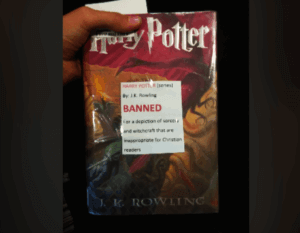The topic of banning books sparks heated debates, touching on our deepest values of freedom and protection. We’ve all heard about it: some argue for shielding young minds from potentially harmful content, while others champion the right to explore diverse ideas without restriction.
In this article, we’re diving into the heart of this contentious issue, exploring the pros and cons from different angles. You see, it’s not just about censorship versus freedom; it’s about finding a balance between safeguarding our communities and nurturing open dialogue.
Let’s face it, it’s a complex topic. Personally, I support the freedom of speech, so much so, that I want to understand any viewpoints that may appear contray to that. By digging into the various perspectives, we can try to shed light on why people feel so strongly on both sides.
“Every man has a right to his opinion, but no man has a right to be wrong in his facts.”– Bernard Baruch
1.Protecting Vulnerable Minds
Pro: Some people argue that banning books with explicit content or sensitive themes is necessary to shield young readers from material that could be harmful to their psychological and emotional well-being.
Con: On the other hand, others believe that restricting access to certain books limits opportunities for young readers to grow intellectually and emotionally by exposing them to diverse perspectives and ideas.
Have you ever wondered why some books have age ratings? Well, it turns out, it’s all about understanding how our brains develop. According to experts, it’s not until we reach our teenage years that we fully grasp complex ideas. That’s when our brains kick into high gear, processing abstract concepts and forming new thoughts.
But here’s the catch: while teenagers are busy figuring out the world, their minds are also more impressionable than ever. That’s because their brains are still in the process of wiring themselves, soaking up everything around them like sponges.
Now, imagine handing them a book filled with complex themes they might not fully grasp yet. Some argue it could be like tossing them into the deep end of a pool before they’ve learned to swim. They might struggle to understand what they’re reading and even be negatively affected by it.
But here’s where things get tricky. What if by shielding young minds from certain books, we’re actually doing them a disservice? Many believe that kids should have the freedom to explore different ideas, even if they’re challenging or uncomfortable.
Most folks I’ve spoken with about this are on the same page: they don’t like the idea of censorship, but they agree that there are certain topics that require more mature minds.
So, where do you stand on this issue? Are you team “protect the kids” or team “let them explore”? It’s a tough call, but one worth thinking about as we navigate the world of book banning.
2. Upholding Community Values
Pro: Picture this: some folks argue that banning books helps maintain community standards and respects cultural or religious sensitivities. By removing materials deemed offensive or objectionable, they believe we’re preserving the moral fabric of our society.
Con: But hold on a second—others see it differently. They say that banning books based on subjective interpretations of morality or ideology infringes upon our right to freedom of expression and access to information. After all, who gets to decide what’s offensive or objectionable?
Here’s the thing about community values—they’re not one-size-fits-all. In a diverse society like ours, what’s considered acceptable in one community might be taboo in another. So, who gets to draw the line?
Well, let’s take a step back and look at the bigger picture. The United States, for example, is a country founded on principles of freedom. It’s essential to remember that everyone has the right to their own beliefs and values. But when those beliefs start encroaching on the rights of others, that’s where things get tricky.
Take the case of the Harry Potter series, for instance. In some communities, these books have been banned or challenged due to their portrayal of witchcraft and wizardry, which some perceive as conflicting with their religious beliefs. However, opponents argue that such bans violate the principles of freedom of expression and access to literature, limiting readers’ exposure to diverse ideas and perspectives.
Surely, there’s a way to uphold personal family values without necessitating that others are deprived of access to materials one may not prefer.
3. Ensuring Academic Integrity
Pro: Imagine a classroom free from distractions and controversy—a space where students can focus solely on learning without the interference of controversial materials. That’s what some argue for when they advocate for removing distracting or controversial books from educational environments. By creating a focused atmosphere for learning, they believe we can enhance academic excellence.
Con: But hold on a minute—others beg to differ. They argue that banning books limits students’ exposure to challenging and thought-provoking literature, stifling critical thinking and intellectual exploration. After all, isn’t education all about pushing boundaries and exploring new ideas?
Let’s take a closer look at the example of social media. Many argue that social media platforms like Instagram and Facebook are designed to negatively impact the way children think, behave, and learn. In fact, several states in the US have accused these platforms of contributing to the youth mental health crisis.
However, while the concerns about social media’s influence on student learning are pertinent, it’s crucial to recognize the differences between digital platforms and printed materials. Unlike social media content, books often undergo rigorous vetting processes, especially academic texts, which are subjected to peer review and scholarly scrutiny.
By banning books based on controversial content, diverse perspectives, and marginalized voices, educational institutions risk limiting students’ exposure to diverse perspectives and inhibiting critical thinking skills essential for academic success. Moreover, academic integrity requires the exploration of challenging and thought-provoking literature, even if it may provoke discomfort or controversy.
So, what’s the verdict? Should we remove distracting or controversial materials from educational environments, or should we embrace the challenges they present as opportunities for growth and learning?
Closing Thoughts

An avid book reader and proud library card holder, Angela is new to the world of e-Readers. She has a background in education, emergency response, fitness, loves to be in nature, traveling and exploring. With an honours science degree in anthropology, Angela also studied writing after graduation. She has contributed work to The London Free Press, The Gazette, The Londoner, Best Version Media, Lifeliner, and Citymedia.ca.

